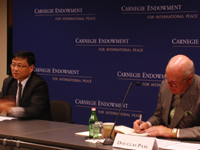Registration
Thank you!
You will receive an email confirming your registration.
IMGXYZ3324IMGZYXChina's economic and political rise is a popular topic in international policy circles. Issues ranging from unresolved territorial claims and questionable trade practices, to an increasingly advanced military are causes of concern for policymakers in the United States and abroad.
Ahead of President Obama’s participation in the upcoming APEC Leaders’ Meeting and the East Asian Summit, Professor Yan Xuetong of Tsinghua University joined Carnegie's Douglas Paal to discuss the ramifications of China's rise in the context of the established international order.
China’s Influence in a Bipolar World Order
China’s rise will alter both the relative distribution of power among nations and the norms and responsibilities underlying the international order, Yan said. Despite Chinese official rhetoric to the contrary, the United States and China will form a bipolar world order in the coming decades, Yan predicted.
- A reluctant power: As late as 2004, the Chinese government prohibited official media from mentioning the “rise of China,” afraid of alarming other major powers and overstating China’s capabilities, Yan explained. Chinese officials still couch their statements in terms of “China’s rejuvenation,” although the Chinese scholarly community has grown more comfortable with candid discussions of China’s growing role in world affairs.
- China in a class of its own: Within 15 to 20 years, the economic gap separating China and the United States from the rest of the world will expand considerably, Yan predicted. Although other rapidly growing countries such as India will enjoy greater influence, only China has any realistic chance of matching the United States in economic power.
- Sharp constraints on China’s strategic influence: In the realm of strategic relationships, however, the United States will remain unchallenged, Yan added. The United States maintains over 70 major alliances, while China has none. Yan characterized Chinese relations with North Korea as a “treaty without substance”, while Sino-Pakistan ties are “substance without [a] treaty.” He explained that key principles in China’s foreign policy prevent it from extending the mutual security guarantees necessary to form alliances.
U.S.-Chinese Competition Inevitable, but Manageable
Although leaders in both Washington and Beijing genuinely seek improved bilateral relations, U.S.-Chinese interactions will likely see intensified economic, political, cultural, and possibly event military competition, Yan predicted. He contended that such competition, however, can ultimately be managed and even channeled to positive ends.
- Structural conditions constrain leaders: Although both American and Chinese leaders genuinely want to avoid bilateral conflicts, structural conditions in the international system make such conflicts inevitable, Yan said. China’s rise will inevitably challenge U.S. preeminence in the international system.
- Beyond “superficial friendship”: Rather than talking blithely about cooperation, American and Chinese leaders should acknowledge that competition is inevitable and work to manage it. In that regard, Chinese Vice President Xi Jinping’s statements prediction of inevitable competition between the United States and China were a refreshingly honest assessment of future trends, Yan said.
- Prevent military confrontation: The real question, Yan said, is how both nations can prevent the inevitable economic, political, or cultural conflicts from escalating into military confrontations. To the extent that both nations can limit their competition to issues such as technology and education, such rivalry can be channeled to productive ends, he concluded.
Expanding Responsibilities, Future Alliances?
China’s conception of its own responsibilities as its global role expands may diverge from the expectations of the United States, creating the potential for more conflict as China expands its participation in global affairs, Yan said.
- Responsibility to pursue Chinese interests: The Chinese government is responsible foremost to the Chinese people, Yan stated, much as the U.S. government is responsible to its own people. Citing President Obama’s vow at the United Nations to promote U.S. national interests, Yan argued that China’s increased participation in international affairs would first and foremost reflect its own national interests. As a result, more conflicts may emerge as China takes on added responsibilities in the international sphere.
- A distinction between developing and developed countries: Developed and developing nations should abide by different sets of norms and standards, Yan argued. For instance, he suggested that industrialized countries should reduce their carbon emissions to a greater extent than developing countries.
- Re-evaluating China’s stance on alliances: As time progresses, the official Chinese position that military alliances are relics of the Cold War will become obsolete and even harmful to Chinese interests, Yan said. Eventually, China should reconsider its stance on entering into mutual security agreements.
Globalization, particularly the information revolution and economic integration, have fundamentally altered the environment in which the Washington and Beijing interact, Yan concluded. As a result, major powers outside the United States and China have a stake in managing relations between the two nations and preventing crises. While military tensions between the United States and China may rise in the future, he argued that such tensions will not escalate into war, nor are they likely to produce the kind of proxy wars seen in the Cold War.
